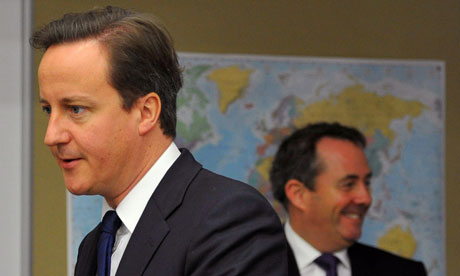David Cameron brokers deal to fill £800m black hole in defence budget
Prime minister reluctant to reopen strategic review but saves Liam Fox from political embarrassment

David Cameron and Liam Fox who averted defence job and programme cuts Photograph: Toby Melville/AFP/Getty Images
The Treasury and the Ministry of Defence have struck a deal to fill a politically embarrassing £800m black hole in this year's defence budget, averting further disastrous job and programme cuts at a time when Britain is involved in two major military conflicts.
The deal, brokered by Downing Street, comes as speculation increased that senior military figures are pressing David Cameron to reopen the strategic defence and security review (SDSR) less than six months after it was completed. Cameron is reluctant to do so.
The defence secretary, Liam Fox, would have been wounded politically if he had been forced to impose fresh cuts.
But there is some scepticism that the deal agreed by the Treasury and the MoD will produce the savings the two sides claim.
The MoD said the deal for the 2011 budget meant there would be no additional cuts this year to armed forces manpower, equipment or capabilities over and above SDSR decisions.
As part of the deal finalised on Wednesday, the MoD has saved £100m by renegotiating the terms of as many as 500 contracts. The deal will also probably require the MoD to delay the purchase of equipment including some helicopters.
It has also agreed to removing 80% of defence equipment and support marketing, reductions in civilian expenses, a 50% reduction in media and PR costs, a cut in the number of photographers, and the sale of some parts of the MoD's broadband spectrum.
Fox is also imposing a new cost control regime on the MoD in a bid to get its escalating costs under control. However there is scepticism that this package will lead to sufficient savings given the MoD's past failures to control its budget.
The Treasury has given ground by saying it will not claw back the savings the MoD makes as a result of the decommissioning of equipment.
The chancellor George Osborne has also agreed that the operational allowance, the top-up paid to soldiers on active duty worth £29.02 a day, will be fully funded by the Treasury. Previously the MoD had to pay half the cost.
Details will be given to the Commons when MPs return after the Easter break.
The MoD insists there will be no reopening of the strategic defence review, even though some senior military figures insist the status of the review is a live discussion. One senior figure disclosed: "There's a lot of objective thinking going on. The uncertain world we envisaged coming down the track is here now".
Cameron is keen not be seen to be inflexible about the SDSR, but would not want a full scale reopening of its assumptions and decisions.
The SDSR was designed to tackle a £38bn defence shortfall and an equipment programme that was over committed and unsustainable after 13 years without a defence review.
Defence sources maintain that the UK has enough Tornado strike aircraft, and the abolition of two squadrons will not see an overall reduction in the number of planes. The Tornado is needed in bothAfghanistan and the no-fly zone in Libya.
The strategic defence review is due to last five years, and some defence ministers argue there is no point revisiting the exercise unless there is a prospect that the funding will also increase.
The defence minister Nick Harvey said this week on BBC Daily Politics: "If we have the same envelope of cash, if we went back to reviewing the defence equation I think we would come to the same conclusions. Nothing that has happened since has led us fundamentally to question the decisions we made at the time."
No comments:
Post a Comment